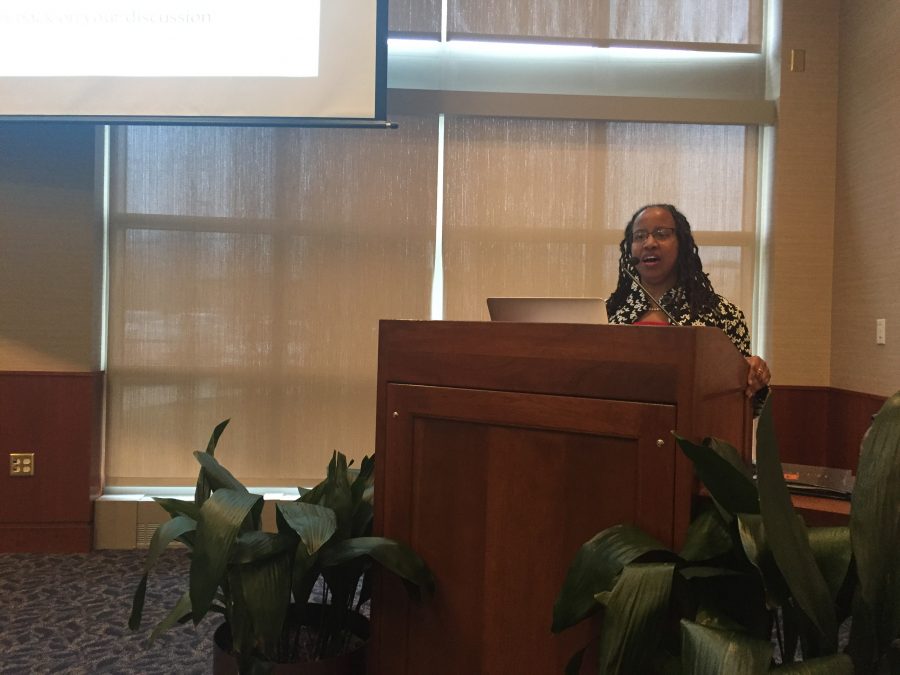Committee discusses identifying sexuality in applications
Associate Chancellor for Diversity Assata Zerai kicked off the Chancellor and Provost’s committee on LGBTQ Concern luncheon at the Alice Campbell Alumni Center Thursday.
Feb 27, 2017
No statistics are kept on the sexual orientations of staff, faculty or students at the University, making it hard to see the range of people who identify as LGBT.
Johnell Bentz, clinical associate professor in the Department of Special Education, said she comes from a college that is open and comfortable, but that it can be hard for other faculty to find people going through similar experiences.
To help counter this and gather thoughts on the campus climate for LGBT, the Chancellor and Provost Committee on LGBTQ Concerns hosts a biannual luncheon to allow faculty, staff and graduate students to meet each other.
“The meaning of the event has evolved over time, but it is a safe space for anyone who identifies as LGBTQ or an ally to come and be socialized together and share a meal,” Bentz, who helps organize the event, said. “Not everyone who identifies on campus is safe where they are or they may be the only person like them in their unit, so it is a place to come and talk.”
Bentz said organizers of the event knew it would be easy to get wrapped up in negative feelings surrounding today’s political climate. Instead, the lunch focused on strategies and ideas to cope and allowed attendees to discuss how to move forward and sustain visibility on campus.
Get The Daily Illini in your inbox!
The luncheon, held Thursday at the Alice Campbell Alumni Center, had 45 attendees and discussions were led by Associate Chancellor for Diversity Assata Zerai.
The University is currently unable to document disparities or benchmark successes regarding enrollment, retention, promotion, equity and other metrics for LGBT employees and students because it does not collect institutional data.
The committee has recommended adding optional identity questions to employment and admission applications. The Graduate College began collecting data and Zerai said the Office of Undergraduate Admissions is open to the idea, but is asking for feedback on best practices.
“There are laws in place to make sure we are not discriminated against, but I think people face subtle discriminations,” Bentz said. “If you don’t have people around you that you can trust to talk about issues, it makes it very isolating.”
A table of employees weighed pros and cons for self-identifying as LGBT. For students, identifying could help target them for LGBT scholarships and funds, as many could face financial consequences from their parents if they come out. For faculty, it could help bring more diversity to units and help monitor issues of discrimination.
Some possible cons were that students might be fearful to include their identity on an application due to fear their parents would see, and also that some students come out once they are on campus, so admission data might be lower than reality.
The University also lacks institutionally required competency training on LGBT issues. The committee recommends that unit heads and administrations undergo LGBT Ally Training. Zerai asked attendees what was the best strategy to make administrators go through training.
One table said training could be aimed at helping people become more competent and effective educators or staff members instead of trying to change their ideas. Having data on how many students are LGBT could help show the need for training on campus.
Additionally, faculty spoke about activism and self-care, such as sustaining momentum and using coping strategies.
“Lately, it feels like we are in a time of continual protest. It seems like every day Trump is saying something we feel the need to respond to, and it seems like they almost have a strategy of trying to wear us out,” Zerai said.
Some coping strategies mentioned were taking two-minute breaks to breathe every day, maintaining connections with friends and loved ones, building support networks and taking a walk during lunch periods.
Zerai spoke about how after 9/11 she was involved with a social movement and got so engulfed in the project that she “forgot her husband” which ultimately led to divorce.
“So yes, these issues are urgent, but they will come and go and always be here at some extent, so you want to make sure you are maintaining your network,” Zerai said.
[email protected]
@MeganAsh_Jones






